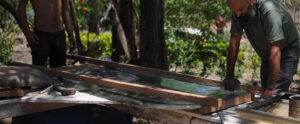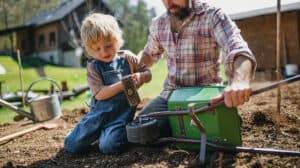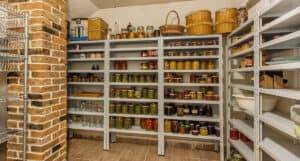I was embarrassed when my dad pulled out the coupons from his mini file folder when I was a kid. I can laugh now because, as a mom and consumer, I know the value of saving a buck, but more than that, it’s about getting the most value from that buck. As a homesteader, we are constantly striving to make more for ourselves, to save, and sometimes make money.
Being frugal usually aligns with our goal of financial freedom. Becoming frugal doesn’t mean you’re cheap; we all want to get the most value from our money, have what we need without debt, and feel good about where the money is going. It is most definitely not about sacrificing health, safety, or personal needs to save money.
How to Start Becoming Frugal
As consumers, being frugal can be hard to do when we are constantly being marketed towards and oversold everywhere we go and look; it is hard to pass up a good deal and shiny new things. I can admit I’m no stranger to wasting money and buying things I don’t need. But, of course, that doesn’t mean you can’t indulge yourself from time to time.
Being frugal is about being a conscious consumer without feeling like you’re sacrificing. Finding a balance between wants and needs is essential. Many of us need to be more frugal due to the rising cost of living because our dollars don’t go as far as they used to.
We all want to save a buck, but there can be many reasons one wants to become frugal with their money and resources. So why do you want to be more frugal? The first step towards becoming frugal is to have a better understanding of your reasons why. Examples include:
- Save money for a goal, or future investment
- Reduce environmental impact
- Working toward financial freedom
- Tired of depending on others and services to feed and entertain you
- All of the above?
Whatever your reasons are, focusing on the most important reasons will help you move forwards into setting goals and taking action. Before making fundamental changes, it is vital to do a little self-evaluation, and take the time to start budgeting and tracking expenses. Understand where your money is going and learn to budget according to your goals.
For example, you may want more money in your pocket and have a smaller environmental impact. Once you’ve tracked your expenses, you can create a new plan for changing any habits that are working against you and create a budget that aligns better with your goals. For example, you can find a cheaper coffee shop, buy or bake your own muffins, make coffee at home, or have take out once a week rather than every day. Knowing what drives your desire to be more frugal will help you create a plan, set budgets, and stick to your goals.
Four Steps to Establishing a Frugal Lifestyle
As homesteaders, we can become frugal yet have more abundance than ever. Homesteading is a lifestyle that increases our self-sufficiency. By producing more, we need less help from industry. One of the easiest ways to be more frugal on the homestead is to start in the kitchen, the heart of any homestead.
- Step 1: Identify your reasons and motivations for becoming more frugal.
- Step 2: Track household expenses, set goals, and design a budget.
- Step 3: Establish long-term habits that will help you accomplish your goals.
- Step 4: Remember to have fun. Frugal living is a marathon, not a sprint.
These steps will help you spend less, make more for yourself, and create less waste. Yet, how you choose to start is up to you. Below I’ve broken frugal living into categories with tips anyone can implement. Go through the list, decide which tips best align with YOUR reasons and goals, and start with those as your next steps. Frugal homesteading isn’t going to happen overnight, but little by little, you can try new tactics, learn new skills, and practice until it becomes second nature and a regular part of your daily life.
Being Frugal with Food
Everyone eats; food is essential. Yet we too often disregard the importance of eating healthily. Eating quality food doesn’t need to be expensive but it may require you to spend more time in the kitchen.
Homesteading introduces us to new habits and skills, including cooking from scratch, preserving food, and zero waste practices. These habits are already considered part of frugal living. The more food we can grow, the less we have to buy. When we can cook meals from scratch, we can save even more. Practicing composting, scrap food cooking, and fermenting reduces waste, which can contribute to producing more food.
Frugal Living Tips
- If you have the space, simply plant more vegetables. If you’re already planting, watering, fertilizing, and harvesting, then going from 1 plant to 10 doesn’t take ten times as long as caring for one plant. Consider incorporating calorie-rich staple crops to make a dent in your caloric needs as well; cucumbers and tomatoes, although delicious, will only keep you full for so long. Consider indoor growing for year-round produce when out-of-season foods and expensive items can’t be grown outdoors.
- Forage, hunt, and fish. Use the environment’s free resources to find food, remember to respect nature, only take what you need, and use as much of the animal or plant as possible.
- Eat and buy in-season food. During peak season, items are usually more affordable, and there is a greater abundance of local produce. Cooking meals with seasonal ingredients or buying in bulk during these times for preservation will save money and give you better quality ingredients.
- Cooking from scratch is one of the best ways to reduce food costs. Homemade meals are always healthier, especially if you are growing your own ingredients or buying them locally and in season.
- Eat what you have. There have been plenty of times when I’ve ran to the store for a random ingredient or two when I could have just made something else with ingredients I already have on hand or made an alternative version.
- Scrap food recycling. Regrowing onions, lettuce, and other food easily for a second harvest is a great way to save money and get more from your food. Saving scraps like carrot peels, onion skins, meat bones, and so forth are great for making broths and soup stocks. Save seeds from seasonal and organic food or food you’ve grown yourself, and compost or feed other scraps to animals. Lastly, you can ferment food scraps to make vinegar and alcohol.
Being Frugal at Home
It costs a lot to live these days, especially if you have a house or space that you pay for heat and power. Whether you can afford to own or rent a lot of square footage, living frugally can often mean downsizing to a smaller space, which usually lowers overall living costs. I loved living in a large farmhouse; however, I was not too fond of the cost of heating or the constant repairs needed to such an old home. Sometimes bigger isn’t better, and it is more expensive. Downsizing can seem unnecessary for some; however, from my personal experience living small lets us live ample in other ways. If moving or downsizing isn’t something you can do or want to do, there are plenty of ways you can still be more frugal around your current home. Below are my tips for being frugal around the house.
- Save on energy costs. Switch off and do more by hand, hang dry clothes, and handwash dishes. Switch out bulbs for LED options and unplug whatever isn’t being used. Use solar chargers for cell phones, small tech items, and solar lights indoors and outside. Search out air leaks and cold windows, and seal up everything to keep heat: the more leaks, the more costs.
- Offset heat cost with a secondary source. If you can add in additional energy or a low-energy heat source. For example, wood stoves, wood furnace, steam and water heat, fireplaces, thermal heating, and cooling. Passive heating and cooling option using the earth, sun, and wind patterns (more for new builders.) Solar and wind can produce additional energy for powering heat. DIY solar pipe heaters can be put on rooftops or southern-facing walls. Those can be easily made with a metal pipe or black tubing system set behind some glass with a fan to direct warm air into your desired location. Clay pot heaters with tealights are a very effective and cheap way to add heat at a low cost.
- Produce less waste. Reduce, reuse and regenerate are the new three R’s. Throw out as little as possible; reducing the waste you bring is the first step. Buy less stuff. The stuff you do have try to reuse as much as possible. Plastic containers from groceries can be reused for storing, growing, and crafting. Boxes can be saved for repurposing in so many ways and can be repurposed in the garden and compost. Food waste, as mentioned, can be regenerated in different ways, growing, composting, and feeding livestock.
Everyday Frugal Living
I find it funny how we get looped into having to get jobs, only to have to pay to get to those jobs. The cost of a vehicle, fuel, and maintenance adds up. Depending on where you live, you can significantly reduce these costs by choosing alternative transportation methods. Homesteaders who live in rural locations will have more difficulty with alternative options. However, learning to carpool and travel only when needed can help reduce costs.
Often, we are too addicted to the freedom, the convenience, or the aesthetic of having our vehicles. If you have access to public transit and can carpool, walk or ride a bike, why not switch it up? We often spend, spend, spend when we don’t have to for the sake of convenience. I hear people say they have no time to exercise or cook from scratch, but you have time to spend an hour on your hair, wait in the drive-thru for 20 minutes, and watch an hour of tv at night. Forget your hair and daily latte; get on the bike and pack some breakfast; Sometimes, doing more for yourself is the path to becoming more frugal. Look at your day-to-day. Can you cut back, share, do it, or make it yourself before spending that extra dollar?
Timeless Tips to Help You Save
- Cut back on fuel costs. Carpool, walk, ride, use public transit, or work more from home. Mow the grass less, snow-blow only when necessary, or share costs with neighbors and work together.
- Eat out as a treat. We spend a lot of money and time in lines waiting for convenience, especially food and drinks. Make your own coffee, lattes, and meals, save your money and make the most use of your time. Restaurants and fast food should be a treat.
- OBWYN. Only buy what you need. We can save a lot of money when we don’t buy things we don’t need. How many deco pillows do you need? Really? Frugal living means not frivolously spending on things we don’t need; the more we practice this, the more we appreciate the things we already have. When we do make a purchase, it’s more thought-out and gives us more value.
- Personal care needs. Less is more. There are essential most of us need, especially females. However, we can reduce the cost of personal items by making our own, purchasing reusable items, and learning to live without them when possible.
- Make your own entertainment. Besides eating out, entertainment costs can add up and be unnecessary. Go outside, pull out a board game, go to a public park concert, build a soapbox car, cook a summer feast, etc. Make your own entertainment and find free options.
- Avoid or combat bad habits and addictions. For example, Tobacco, alcohol, coffee, sugar, etc., are expensive and usually unhealthy habits. However, whatever your addictions are, you can be more frugal by reducing, quitting, changing habits, and ultimately spending less money and time on those items.
- Do it yourself. Fix, build, and create it yourself. Stop paying others to do things you can do yourself. Paint that wall, rewire the lamp, change your own tire, and if you don’t know how to, ask for help and learn. The more we learn, the more we can do, and the less we have to pay others to do it.
- Invest time in learning. Frugal people are often highly skilled, invest their time wisely, and learn as much as possible, not just for fixing things but any topic that might interest you, be helpful in the future, or pertain to a current situation. Moreover, learning is free; what’s more frugal than that?
- Barter and trade. Yes, it is still a thing, and the more you ask others to barter, the more others will consider your trade as valuable as money. Barter and trade whenever you can for services, items, or educational opportunities.
- Bargain shop. Be proud to use coupons, comparison shop, or buy in bulk for deals; a good deal is nothing to be ashamed of.
Being Frugal with Friends
- Share resources. Sometimes we save more when we share and work with others. Consider sharing resources that can help you and others — for example, sharing tools, equipment, garden space, livestock, products, skills, etc. I know many farmers who will gladly take volunteers during harvest season to help harvest in exchange for produce alongside knowledge and experience. Homesteaders, large and small, can do the same.
At our small homestead, we share the snowblower with our neighbor, who shares his wood splitter. He maintains the blower and does the driveway, and he can use it for his drive anytime he likes. His wood splitter stays here since he doesn’t heat with wood, and we do. We share because it benefits us both. Frugal living sometimes is a community effort.
- Teaming up with others to buy items in bulk is a great way to get the most bang for your buck. Back in the day, my family and friends would all go in on a whole cow for meat. Then, sharing the cost between 4-6 people, we would each get 6-12 months’ worth of beef, which was less than half the purchasing price if we bought it week by week at the butcher.
- When it comes to gatherings and holidays, consider making more items yourself; Bring homemade gifts and food, be the entertainment, or bring a game; you don’t have to spend a lot to have a good time with friends and family. When receiving gifts, ask people only to buy you what you need, give a list, or give them suggestions. Ask for something homemade and give homemade gifts. This isn’t just a part of frugal living; it is part of the true nature of giving, “giving from the heart.’
Final Thoughts on Frugal Homesteading
Frugal living can give us more freedom and teach us how to really appreciate the things we already have. Just remember, like anything, don’t let frugal living take you over. It’s inefficient for anyone to cut costs or corners at every turn. Too cheap can sometimes lead to unhealthy habits that can affect physical and mental health, secluding behaviors and even regret. Your health and aspirations are essential to invest in, don’t sidetrack growth to save money. My last piece of advice is never to compare yourself or your lifestyle to others and to not dwell on things you don’t have. Appreciate what you have, what you know, what you’ve already achieved in life, and what you could achieve by learning to spend less, making more at home, and having more time to enjoy life.








